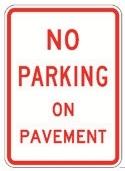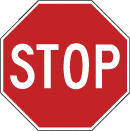
Section 7: Signs, Signals, & Markings
Section 7: Signs, Signals & Markings
This Section Covers
- Road Signs
- Shapes of Signs
- Regulatory Signs
- Warning Signs
- Guide Signs
- Construction and Maintenance Warning Signs
- Service Signs
- Traffic Signals and Signs
- Lane Control Signals
- Overhead Lane Signs
- Pedestrian Signals
- PHB/WALK Signal
- Pavement Markings
- Stop Lines
- Crosswalk Lines
- Railroad Crossings
- Center Lines
- No Passing Lines
- Edge Lines
- Lane Lines
- Traffic Striping
- Turn Lanes
- Bicycle Lanes
- Roundabouts
It's the Law
Georgia law requires that all drivers, including bicyclists, obey official highway signs and traffic control signals unless otherwise directed by a police officer or emergency worker.
Road Signs
Shapes of Signs
The State of Georgia uses seven basic shapes of signs to convey traffic control instructions. Drivers should know signs by their shapes and colors so that they may recognize them from a distance and begin reacting timely and appropriately.
Vertical rectangle signs

Vertical Rectangle signs are generally used for regulatory signs, which tell you what you must do. You must obey them in the same manner as traffic laws.
Horizontal rectangle signs

Horizontal Rectangle signs are generally used as guide signs. They show locations, directions, or other special information.
Octagon signs

An Octagon (eight-sided shape) always means stop. When you come to it, you must make a complete stop at a marked stop line. If there is no stop line, stop before the crosswalk on your side of the intersection. If there is no crosswalk, stop at a point from which you can best see oncoming traffic. You must not start again until all pedestrians have finished crossing on the side of the roadway you are traveling on, and you have yielded the right-of-way to closely approaching traffic.